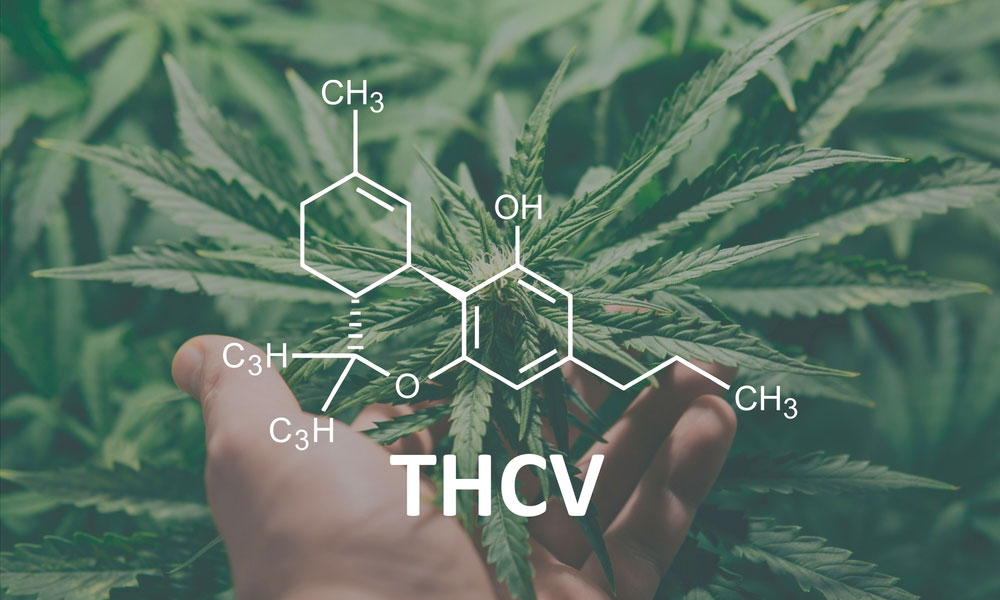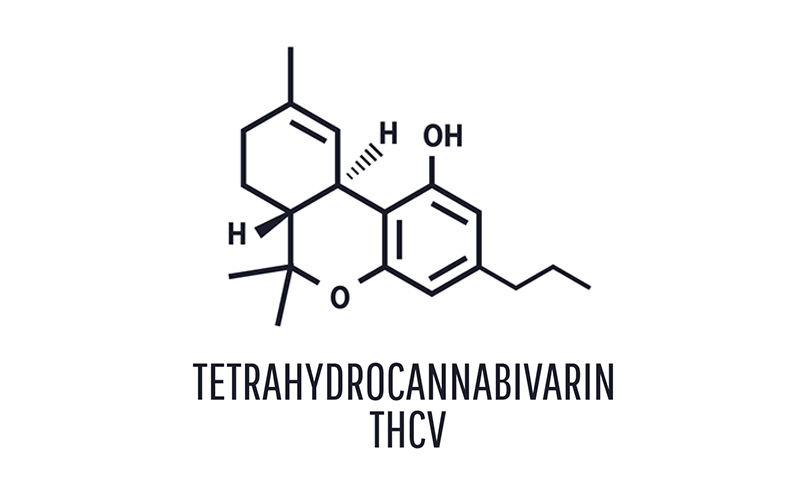
The use of medical cannabis products is on the rapid rise. It should be noted that cannabis has hundreds of organic compounds. Each has its distinct profile in addition to producing different effects on the body. Some compounds such as THCV (Tetrahydrocannabivarin) have been associated with many potential health benefits. Its use is surprisingly increasing and now more than ever people want to know what is THCV? Besides that, how does it work in the body, its potential side effects, and what is its legal status? This article offers a comprehensive guide to tetrahydrocannabivarin, highlighting all the key aspects of this compound.
What is THCV?
THCV (Tetrahydrocannabivarin) is one of the active compounds found in cannabis plants. The cannabinoid was first discovered in the 1970s and is currently found in more than 700 cannabis strains. The phrase ‘varin’ that is added to THC’s name indicates that it contains added atom chains at the end of its molecule.
You can use the organic compound naturally from hemp and cannabis plants. However, most people prefer to use the extracted form which is mostly found in the form of THCV gummies, oil, or vapes. It has built its reputation as a therapeutic compound with great health benefits. Thus, it can be a great addition to individuals who are looking for organic supplements for relief.
How Tetrahydrocannabivarin Works
THCV is a cannabinoid and so it tends to interact with the endocannabinoid system. This system has endocannabinoid receptors that THCV might influence. The human body consists of two major endocannabinoid receptors, CB1 and CB2.
CB1 receptors are mainly found in the brain and the nervous system. Note that they usually interact with the brain’s neurotransmitters to produce euphoric highs or mind-altering effects. THCV’s interaction with CB1 is what normally leads to THC-like psychoactivity. Taking low doses of THCV will it make CB1 an antagonist. This means that it won’t produce psychoactive effects. On the other hand, taking high doses will produce the opposite effects.
CB2 receptors are primarily found in the immune system. Research reports indicate that THCV is CB2’s partial agonist. THCV is capable of activating CB2 receptors but only to a limited extent. This makes it beneficial for producing antiepileptic and anti-inflammatory effects.
THCV vs THC: What’s the Difference?
Comparing THCV vs THC, it’s clear that they both have different chemical structures. THCV is made up of a 3-carbon side chain while THC consists of a 5-carbon side chain. Understand that the length of the side chain has a significant influence on the potency. That’s why THCC which has only one carbon side chain virtually doesn’t have psychoactive effects. On the other hand, THCP with 7 carbons is almost 33 times more potent than delta-9 THC!
In this case, THC is more potent and has more pronounced psychoactive effects than THCV. Legally, these two compounds are usually not treated the same. THC is illegal federally and faces stricter regulations compared to THCV. You will also find that there are some states where THCV is legal if it comes from hemp plants.
Does THCV Get You High?
Does THCV get you high? Yes. But this can only happen if you take THCV in large doses. This cannabis compound’s psychoactive properties are mild and are likely to kick in when you consume much of it. Understand that taking it in small doses makes it a CB1 antagonist. This means that it functions and produces the opposite effects of delta-8 and delta-9 THC. Furthermore, this also means that THCV can counteract the psychoactive effects of THC in low doses. This feature definitely explains why most THCV users normally end up feeling clear-headed after using it. However, it’s important to know that higher THCV doses will kick in a different set of effects. Once you consume more than 30 mg, then the THCV becomes psychoactive.
Potential Benefits of THCV
The potential THCV benefits are numerous. But it’s important for users to understand that this compound has biphasic effects. This means that it normally produces different effects at various dosages. Using THCV can produce health benefits such as:
- Increased focus
- PTSD treatment
- Anxiety treatment
- Reduce panic attacks
- Energizing benefits
- Appetite-suppressant
- Depression treatment
- Alzheimer’s treatment
- Anti-inflammatory properties
- Stimulating bone growth
- Improved insulin resistance
To experience these benefits, take low doses such as 10 mg of THCV or less. Besides that, know that the wellness benefits will vary depending on whether you are using THCV isolate, full-spectrum, or a broad-spectrum product.
Can I Take THCV for Weight Loss?
Yes, you can take THCV for weight loss. This compound is widely known for its appetite-suppressing benefits. It can reduce appetite by inhibiting the functions of CB1 receptors. Research studies show that it’s a neural antagonist of CB1 that can reduce the connectivity of resting-state functions. On the other hand, it can increase connectivity in the dorsal visual stream and cognitive control networks. These effects can be extremely beneficial to obese individuals. Overall, the appetite-suppressing effects ensure that users eat less and burn more calories from the body.
How to Take Tetrahydrocannabivarin
THCV is popularly known as the “diet weed”. Thus, you can take THCV gummies which are delicious and are usually available in pre-dosed servings. this is ideal for those who are looking for convenience, ease of use, and lasting effects.
Alternatively, you can find THCV isolate in form of tinctures or oils. They are mainly used for sublingual intake. Some people usually opt to mix the oil with their favorite drinks or food for ease of use. THCV vape cartridges are also ideal for those who want almost instant effects. Overall, you can find THCV in various forms. So, how you choose to take it depends on your personal preferences.

Is THCV Safe?
Taking the right doses of THCV (as well as other cannabinoids) makes it safe. This cannabis compound is usually well-tolerated in low-moderate doses. however, higher doses can result in problematic side effects in some users. To safely use THCV and avoid negative effects, consider the dosage. Besides that, it’s important to verify the source and quality of the product. therefore, ensure that you make your purchases from a reputable retailer or a licensed dispensary. In case you are unsure about the safety of a THCV product, ensure that you first speak to your doctor regarding your concerns.
Potential Side Effects of THCV
The potential side effects of THCV (Tetrahydrocannabivarin) aren’t extensively documented. This is because there haven’t been extensive studies done to determine the safety and profile of this compound. Preliminary reports indicate that it can reduce appetite and that’s why there are lots of THCV for weight loss products. This can definitely have a positive effect on those seeking to lose weight.
There are also reports suggesting that it can cause paranoia, symptoms of psychosis, and short-term memory use. THCV can also interact with certain over-the-counter and prescription medications. If you are taking a supplement or any medication, ensure that you first consult with your doctor. In addition to that, you can avoid the negative THCV effects by consuming it in moderate doses.
Will THCV Cause Me to Fail a Drug Test?
Note that most drug tests usually look for THC metabolites. Understandably, some tests also test for the presence of THCV compound even though this might not be indicated in the conclusive results. So, THCV can show up on a drug test. Additionally, it can also appear in a urine test. This is because it can create the same metabolites that standard THC drug tests can detect. THCV metabolites can remain in your system for up to two weeks. If you have an upcoming drug test, then you should avoid using it.
Is Tetrahydrocannabivarin Legal?
Even though THCV hasn’t been specifically classified as a scheduled drug, it’s closely related to THC. THC is a psychoactive schedule I drug that is currently illegal under federal law. So, in the states where THC is legal, THCV is also illegal for sale, consumption, or possession.
It’s important to note that the passing of the 2018 Farm Bill made hemp plants and all their derivatives legal federally in the US. This means that THCV from hemp plants would be legal for use. However, it’s important for you to do comprehensive research and ensure you understand your state’s laws before purchasing and using THCV.
Where Can I Find THCV?
THCV is found in high amounts only in specific strains. Since it isn’t naturally produced in reasonably high concentrations in most strains, there is an incredibly big challenge in finding the source. However, its unique profile including potent powerful effects has been attracting the attention of consumers, manufacturers, and growers alike. People can find THCV in a more generic form as full-spectrum cannabis oil or extract.
They can find THCV for sale in physical retail stores, especially in states where hemp and marijuana products are legal. They can also make purchases online from reputable companies. When making purchases, look for products that come from African sativa strains. Ask about the parent’s genetics and request a certificate of analysis. This is important in verifying the legitimacy of the product.
High THCV Strains
High THCV strains are mostly found in cannabis sativa plants originating from Africa. Until now, the reasons for this case are still unclear. It should be noted that indica strains have minimal THCV content. The highest THCV strains include:
Dougs Varin: it’s the most popular THCV-rich strain. Its profile features an earthy pine aroma coupled with some citrusy notes. Dougs Varin is ideal for suppressing appetite and enhancing mental stimulation.
Malawi Gold: the sativa landrace strains originates from Malawi. It’s ideal for suppressing appetite and promoting weight loss. Besides that, it provides uplifting and mentally stimulating effects.
Swazi Gold: it’s a rare landrace cannabis sativa strain that originates from Swaziland. Swazi Gold thrives in fluctuating weather and usually produces an appealing citrusy flavor. additionally, it’s known for its fast-acting effects, making it great for relaxation.
Red Congolese: it originates from Congo. The colorful strain is ideal for promoting mild stimulation and mental clarity. Furthermore, you can use it to ease the symptoms of stress, mind fog, and stress.
Willie Nelson: it’s an award-winning THCV-rich strain that has a sweet, sour taste. Willie Nelson usually encourages clear-headedness high, especially when users consume high amounts.
Power Plant: its THC content normally ranges between 15 and 20 percent with an equal level of THCV. It’s ideal for easing stress, anxiety, and pain.
Pineapple Purps: the sativa strain is also known as Purple Pineapple. It’s rich in THCV with moderate amounts of THC.
Skunk #1: an award-winning strain that’s a cross of Afghani landrace, Acapulco Gold, and Colombian Gold. It’s known for its high-energy buzz and therefore, is often used to treat stress, anxiety, and depression.
Pink Boost Goddess: the hybrid strain is ideal for reducing anxiety, providing pain relief, suppressing appetite, and easing symptoms of Alzheimer’s. Consuming high amounts of this THCV-rich strain usually leads to euphoric relaxation.
Jack the Ripper: the award-winning sativa dominant strain has a sweet aroma with some hints of spiciness. It normally produces great mental stimulation and results in almost instant cerebral lifting.
Final Thoughts
THCV is a unique cannabinoid that offers a wide range of effects, depending on the dosage. It might be the energy stimulant you need in order to stay productive during the day. Besides that, it can suppress your appetite and trigger weight loss. Other studies indicate that THCV can help ease the symptoms of stress, anxiety, and depression. This makes it great for managing mood disorders. However, taking high doses of THC can lead to euphoric highs. Therefore, it’s important to always ensure that you exercise caution when using it to attain the desired effects. In low doses, this is a well-tolerated compound. However, its level of safety quickly changes with the dosage.
